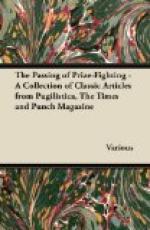Then there is the story that prices, especially the prices of food, are exceedingly high in Brighton. After all, the cost of food depends everywhere very much upon what you eat. I see no reason for supposing that the price of whelks in Brighton compares unfavourably with the price of whelks in other great whelk-eating centres; but the price of fruit is undeniably high. I saw some very large light-green grapes in a shop window, grown, I suppose, over blast furnaces, and when I asked what they cost I was considerably surprised. Being afraid, however, to go out of the shop without making a purchase, I eventually bought one.
But these things are all by the way. It was when I reached the sea-front at Brighton that I made the tremendous discovery which is really the subject of this article. I realised the secret of Brighton’s charm. It can be stated very simply. It lies in the number of things one needn’t do there.
At little seaside resorts, such as Cockleham, there are a very limited number of things that people do, and as soon as one gets to Cockleham an irresistible inclination seizes one not to do them to-day. If anybody says it is a good day for bathing you say it is better for boating. And if they agree you wonder if, after all, golf.... And so you preserve your independence and feel rested and stave off for a little while the evil day. But only for a little. Very soon, for lack of alternative suggestions, you are bound to be dragged in and do something.
But at Brighton the number of things to do is so enormous and so varied that you can spend days and days in not doing them. On the pier alone there are something like a hundred complicated automatic machines which you needn’t work; there are fishing-rods which you needn’t hire, and concerts to which you needn’t listen. The sea is full of rowing boats and motor-launches which you needn’t charter, and the land is full of motor-brakes which you needn’t board. You needn’t mixed-bathe nor go and watch the professional divers, nor the fish in the Aquarium, nor the people with Norman profiles arriving in motor-cars at the hugest hotels. You can simply sit still on the beach and discuss which of these exciting things you won’t do first. And while you sit still on the beach you can throw pebbles into the sea. No one has ever thrown as many pebbles into the sea in his life as he wanted to, because someone keeps saying, “Well, you must decide;” but at Brighton you can throw more than in any seaside place that I know. And, now I come to think of it, I wonder that there is no charge for throwing pebbles into the sea at Brighton. I should have thought a low wall with turnstile gates and three or four shies a penny ... but I leave this commercial idea for the Town Council to work out.
When I had thrown a great many pebbles into the sea I began to nerve myself for the struggle of returning. Over that struggle I prefer, as the saying is, to draw a veil. Suffice it to say that it is harder to run up to Brighton than it is to run down. But whilst I was running up I made a curious and interesting discovery. I found that the spell of Brighton had cured my cold. I had lost it in the soothing excitement of wondering what not to do next. This is the true panacea.




